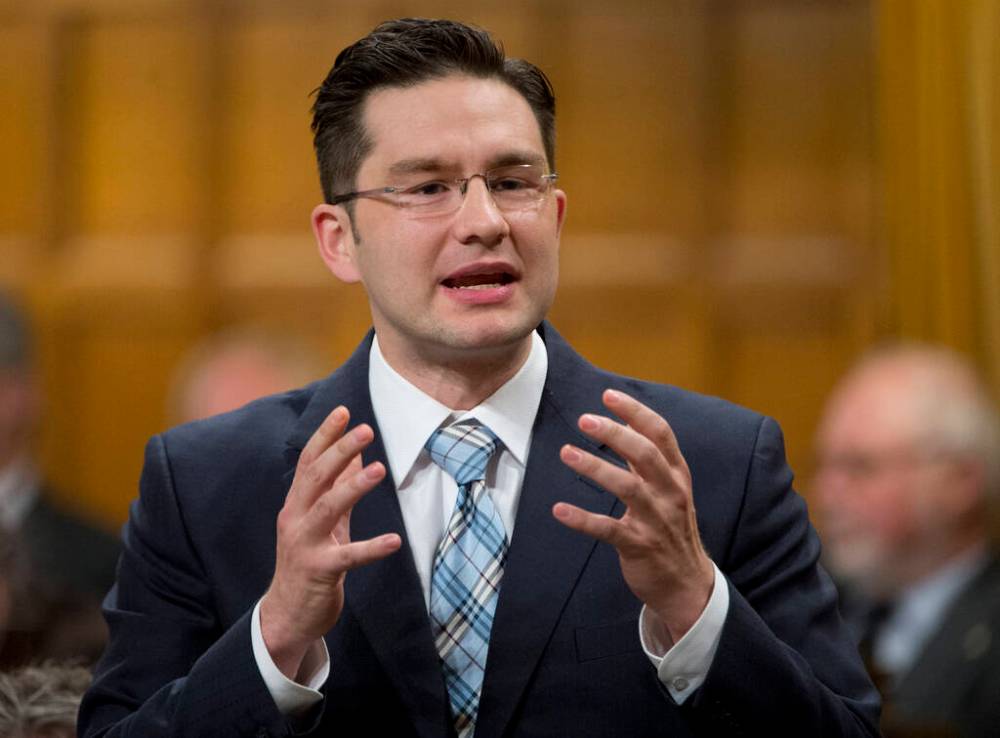Poilievre waiting for his moment to arrive
Advertisement
Read this article for free:
or
Already have an account? Log in here »
To continue reading, please subscribe:
Monthly Digital Subscription
$0 for the first 4 weeks*
- Enjoy unlimited reading on winnipegfreepress.com
- Read the E-Edition, our digital replica newspaper
- Access News Break, our award-winning app
- Play interactive puzzles
*No charge for 4 weeks then price increases to the regular rate of $19.00 plus GST every four weeks. Offer available to new and qualified returning subscribers only. Cancel any time.
Monthly Digital Subscription
$4.75/week*
- Enjoy unlimited reading on winnipegfreepress.com
- Read the E-Edition, our digital replica newspaper
- Access News Break, our award-winning app
- Play interactive puzzles
*Billed as $19 plus GST every four weeks. Cancel any time.
To continue reading, please subscribe:
Add Free Press access to your Brandon Sun subscription for only an additional
$1 for the first 4 weeks*
*Your next subscription payment will increase by $1.00 and you will be charged $16.99 plus GST for four weeks. After four weeks, your payment will increase to $23.99 plus GST every four weeks.
Read unlimited articles for free today:
or
Already have an account? Log in here »
Hey there, time traveller!
This article was published 16/04/2022 (1337 days ago), so information in it may no longer be current.
There was a time, not that long ago, when it would have been unimaginable for someone with Pierre Poilievre’s views and ambitions to become prime minister of Canada.
Too extreme. Too divisive. Too cynical. Too quick to stoke fear and anger simply for the sake of exploiting both for political and personal gain.
Canada, the self-reverential story goes, is too moderate and reasonable and, well, sensible to embrace and elevate such a figure.

Even if that were once true, it’s a tale that is now told in the past tense. Mr. Poilievre, the fast-talking, outrage-seeking, trucker-sympathizing career MP for Carleton, is on what at this juncture seems to be a virtually unimpeded path to winning the Conservative Party of Canada leadership.
Barring an unforeseen surge by one of the contest’s currently flailing other candidates — former Quebec premier Jean Charest, a more moderate and centrist voice, seems the only one with a legitimate shot, but he’s trailing badly and shows little chance of making up enough ground by September to pre-empt the front-runner’s ascension — Mr. Poilievre will become the CPC’s standard bearer and will face off against Prime Minister Justin Trudeau’s Liberal Party in the next federal election.
Such a turn of events would create a very interesting — and, on many levels, troubling — situation in Canadian politics.
Mr. Trudeau has been in power for six-and-a-half years, having manufactured a stunning upset of Stephen Harper’s Conservatives on the strength of youthful optimism, political-celebrity appeal and “sunny ways” promises, but his popularity-poll trajectory since 2015 has been distinctly downward.
Hamstrung by scandals and pummelled by the pandemic, Mr. Trudeau has gone to the polls twice (2019, 2021) in pursuit of a renewed majority mandate and failed, gaining only minority status while losing the popular vote both times.
It is not inconceivable that the time will soon arrive when he has worn out his welcome. If that happens — and there are significant reasons beyond Mr. Trudeau’s middling popularity that it remains a rather big “if” — Mr. Poilievre’s moment will have arrived.
The obstacles between the CPC and election victory are not insubstantial. Conservatives are a divided and disparate bunch, with those in the West shouting “Freedom!” and latching onto libertarian causes and inflamed made-in-America Trumpian rhetoric, and those east of the Manitoba/Ontario border seeking a more traditional centre-right alternative to Canada’s “natural governing party.”
Despite being deeply rooted in Ottawa as the MP for the Carleton suburb since 2004, Mr. Poilievre (who was raised in Calgary) has tapped into the populist acrimony rooted in Alberta and Saskatchewan and made it the fuel of his leadership pursuit.
He unapologetically — and, one might argue, with callous opportunism — aligned himself with the truckers’ convoy that disrupted cities and borders across the country, and more recently has railed against inflation and housing prices, criticized federal monetary policy (while promoting cryptocurrency as a rebellious alternative) and argued against climate-change mitigation, all the while calling for an end to “gatekeepers” and, without pledging much in the way of practical solutions, promising to make Canada “the freest nation on Earth.”
Mr. Poilievre has shown a natural aptitude for projecting a shared sense of outrage with those on the political fringes whose voices have found amplification as populism has gained traction in the era of online echo chambers and polarized misinformation.
Division, anger and perpetual grievance are on the rise, but they do not good politics make. Mr. Poilievre has nonetheless decided his political fortunes depend wholly on their exploitation. Should he eventually succeed in turning his aspirational “if” into an electoral-victory “when,” a new era in Canadian politics will have dawned.


